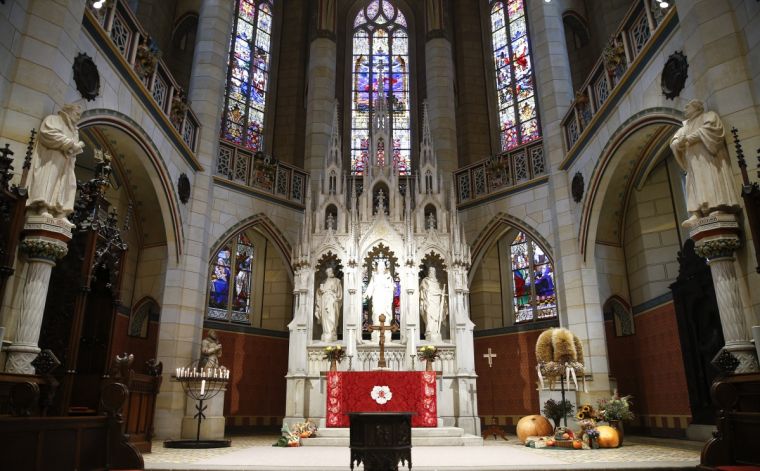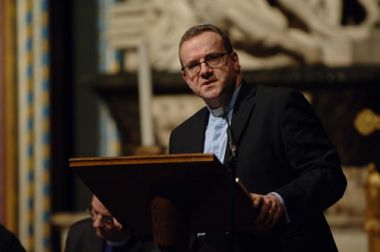His goal was a New Reformation: Don Carson on Mike Ovey

Mike Ovey was many things. Laying aside his personal life, where he was above all and most importantly a husband
and a father, I shall survey his public life.
Mike was a scholar and a writer. His two most important books, Pierced for Our Transgressions: Rediscovering the Glory of Penal Substitution, co-written with Steve Jeffery and Andrew Sach (2007), and Your Will Be Done: Exploring Eternal Subordination, Divine Monarchy and Divine Humility (2016), are models of clarity and careful reasoning on theological issues that are simultaneously traditional, contemporary, and important. His grasp of the patristic sources in the latter volume is wholly admirable.
But Mike could and did write at popular levels. Moreover, especially in essays published in Churchman and Themelios, he wrote for theological students and pastors. Perhaps the best piece he wrote for the Themelios column, which he filled three times a year, was, 'The Art of Imperious Ignorance' (2016).
Mike made himself something of an expert on several more topics on which he wrote little, but thought much, not least the doctrine of justification. Better yet, he was generous with his scholarship. I heard about the topic of his unpublished doctoral dissertation and wrote to him to ask if it was going to become available. He promptly sent me a digital copy, and a detailed note indicating where he had changed his mind on some relatively minor details.
Mike was a churchman, a preacher, a confessional evangelical. When his responsibilities did not take him away, he and his family could be found in their local church, Sunday by Sunday. And not just Sundays: Mike contributed to the pastoral leadership in his cheerful willingness to preach, to counsel, to pray, to plan, to teach and encourage.
The debates that sometimes engulf the denomination in which he was nurtured did not find Mike sidelined, too busy with his own patch to roll up his sleeves and try to exercise a godly influence in the corridors of power. Although the principal of a recognized Anglican training college, he was the friend, encourager, and counselor of pastors and leaders of independent churches. Confessionally Reformed, he nevertheless moved comfortably within a broader evangelical constituency.

Mike was a teacher and a mentor. Here he excelled, not because he was always well ordered and structured (he often wasn't), but because he was contagious. He understood intuitively that it is more important for his students to become excited over the scriptures and theology than to get through the assigned passage or topic. Nowhere was his influence more marked than in his private mentoring, his personal availability, his willingness – more, his eagerness – to spend time with his students.
Some of this sprang from his natural gregariousness; some of it sprang from his understanding that much in the Christian life is caught better than it is taught. He could deliver a formal address to the crowds at GAFCON and leave them hungering for more, and he was no less at home bringing comfort to a grieving student recently bereaved.
Mike was, ironically, an excellent educator and an indifferent administrator. In the last years of his life, during which he served as the Principal of Oak Hill College, Mike continued to grow: the pastor-theologian became the theologian-teacher-mentor, who became the theologian-principal, the public educator. Some of those years were both tumultuous and painful – but the best leaders learn from tumult and pain.
In the best sense, Mike was authentic: there was no false note in his character. Certainly, nothing dulled his well-honed eccentricities and impish sense of humour. Administration was not his strong suit, and doubtless that played some part in the challenges that were eventually overcome. But by the time of his premature death, Mike, working with others, had put in place a team in which each member played to his strengths.
Oak Hill was hiring some excellent people. At a time when most of the university theology faculties are in decline, and when the independent theological colleges are facing challenges of various kinds, Oak Hill under Mike's leadership has become the institution that confessional Christian leaders view with greatest respect. If Oak Hill can continue on the same trajectory, and increase its focus and skill in recruitment, its future as the leading theological college in England will be secure.
Yes, Mike was many things. But we miss the significance of his life if we overlook his vision: his goal was nothing less than a new reformation in the United Kingdom and beyond. He was quite explicit about this vision, and it shaped his priorities. Undaunted by cultural and ecclesiastical tides that threatened historic Christian life and thought, he pressed on, fully aware that although reformation might come in his generation, it might not come until the next, or the one after that – or it might not come at all, and God might well deal with us in judgment.
He understood that if reformation came, it would need robust theological thinking – courageous, principled, faithful to the evangel – and so he did not want to be an evangelly. He understood that there is value in diverse theological education delivery systems, but he clearly saw that there is always room at the top.
Doubtless God raises up a handful of people who are autodidacts, gifted preachers and teachers and reformers who read themselves into biblical and theological maturity, but they are not the norm. Such people hold high the English tradition of the gifted amateur (whose stance reminds one of the old Flanders and Swann song humorously excoriating foreigners who 'practise beforehand and ruin the fun'), but they are not the norm.
What is needed is a generation of pastor-theologian-evangelists, people with the minds and hearts and training of Luther, Calvin, Melanchthon, Cranmer, Knox, Owen, Whitefield, and Wesley. Mike was a reformer.
May God enable us to honor his memory by strengthening and pursuing his vision.
This article will be published in the latest Commentary is published twice annually and is available to read online from the homepage of Oak Hill College, on Twitter @OakHillLondon. Author Dr Don Carson is a Canadian-born, Reformed Evangelical theologian and Research professor of the New Testament at Trinity Evangelical Divinity School. A prolific author, his latest work is The Enduring Authority of the Christian Scriptures (IVP, 2016). He is co-founder (with Tim Keller) of The Gospel Coalition.











